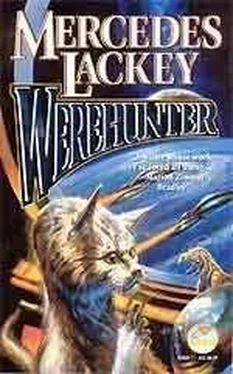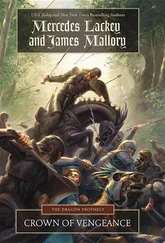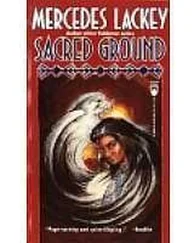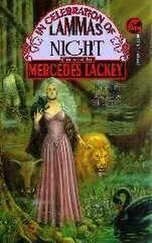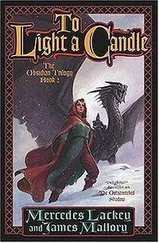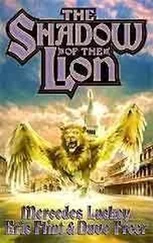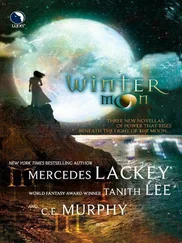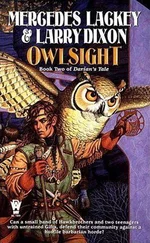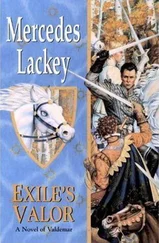He came to the place where her tracks ended—and closed his eyes, a frown-line between his brows. Late afternoon sun filtered through the branches and touched his face; Glenda thought with growing confidence that he had been totally fooled by her trick. He carried a strung bow, black as his clothing and highly polished, and wore a sword and dagger, which none of the villagers ever did. As her fear ebbed, she had time to think (with a tiny twinge) that he couldn’t have been much older than she—and was very, very attractive.
As if that thought had touched something that signaled him, his eyes snapped open—and he looked straight through the branches that concealed her to rivet his own gaze on her eyes.
With a mew of terror she leapt out of the tree and ran in mindless panic as fast as she could set paw to ground.
The sun was reddening everything; she cringed and thought of blood. Then she thought of her dream, and the dweller-in-the-circle. If, instead of a false trail, she laid a true one—waiting for him at the end of it—
If she rushed him suddenly, she could probably startle him into the power of the thing that lived within the shelter of those stones. Once in the throes of its mental grip, she doubted he’d be able to escape.
It seemed a heaven-sent plan; relief made her light-headed as she ran, leaving a clear trail behind her, to the place of the circle. By the time she reached its vicinity it was full dark—and she knew the power of the dweller was at its height in darkness. Yet, the closer she drew to those glowing stones, the slower her paws moved; and a building reluctance to do this thing weighed heavily on her. Soon she could see the stones shining ahead of her; in her mind she pictured the man’s capture—his terror—his inevitable end.
Leopard-Glenda urged—kill!
Girl-Glenda wailed in fear of him, but stubbornly refused to put him in the power of that .
The two sides of her struggled, nearly tearing her physically in two as she half-shifted from one to the other, her outward form paralleling the struggle within.
At last, with a pathetic cry, the leopard turned in her tracks and ran from the circle. The will of girl-Glenda had won.
Whenever she paused to rest, she could hear him coming long before she’d even caught her breath. The stamina of a leopard is no match for that of a human; they are built for the short chase, not the long. And the stamina of girl-Glenda was no match for that of he who hunted her; in either form now, she was exhausted. He had driven her through the moon-lit clearings of the forest she knew out beyond the territory she had ranged before. This forest must extend deep into the Waste, and this was the direction he had driven her. Now she stumbled as she ran, no longer capable of clever tricks, just fear-prodded running. Her eyes were glazed with weariness; her mind numb with terror. Her sides heaved as she panted, and her mouth was dry, her thirst a raging fire inside her.
She fled from bush to tangled stand of undergrowth, at all times avoiding the patches of moonlight, but it seemed as if her foe knew this section of the wilderness as well or better than she knew her own territory. She could not rid herself of the feeling that she was being driven to some goal only he knew.
Suddenly, as rock-cliff loomed before her, she realized that her worst fears were correct. He had herded her into a dead-end ravine, and there was no escape for her, at least not in leopard-form.
The rock before her was sheer; to either side it slanted inward. The stone itself was brittle shale; almost impassable—yet she began shifting into her human form to make that attempt. Then a sound from behind her told her that she had misjudged his nearness—and it was too late.
She whirled at bay, half-human, half-leopard, flanks heaving as she sucked in pain-filled gasps of air. He blocked the way out; dark and grim on the path, nocked bow in hand. She thought she saw his eyes shine with fierce joy even in the darkness of the ravine. She had no doubts that he could see her as easily as she saw him. There was nowhere to hide on either side of her.
Again leopard-instinct urged—kill!
Her claws extended, and she growled deep in her throat, half in fear, half in warning. He paced one step closer.
She could—she could fight him. She could dodge the arrow—at this range he could never get off the second. If she closed with him, she could kill him! His blood would run hot between her teeth—
Kill!
No ! Never, never had she harmed another human being, not even the man who had denied her succor. No!
Kill !
She fought the leopard within, knowing that if it won, there would never be a girl-Glenda again; only the predator, the beast. And that would be the death of her—a death as real as that which any arrow could bring her.
And he watched from the shadows; terrible, dark, and menacing, his bow half-drawn. And yet—he did not move, not so much as a single muscle. If he had, perhaps the leopard would have won; fear triumphing over will. But he stirred not, and it was the human side of her that conquered.
And she waited, eyes fixed on his, for death.
:Gentle, lady.:
She started as the voice spoke in her head—then shook it wildly, certain that she had been driven mad at last.
:Be easy—do not fear me.:
Again that voice! She stared at him, wild-eyed—was he some kind of magician, to speak in her very thoughts?
And as if that were not startlement enough, she watched, dumbfounded, as he knelt, slowly—slowly eased the arrow off the string of his bow—and just as slowly laid them to one side. He held out hands now empty, his face fully in the moonlight—and smiled .
And rose—and—
At first she thought it was the moonlight that made him seem to writhe and blur. Then she thought that certainly her senses were deceiving her as her mind had—for his body was blurring, shifting, changing before her eyes, like a figure made of clay softening and blurring and becoming another shape altogether—
Until, where the hunter had stood, was a black leopard, half-again her size.
Glenda stared into the flames of the campfire, sipping at the warm wine, wrapped in a fur cloak, and held by a drowsy contentment. The wine, the cloak and the campfire were all Harwin’s.
For that was the name of the hunter—Harwin. He had coaxed her into her following him; then, once his camp had been reached, coaxed her into human form again. He had given her no time to be shamed by her nakedness, for he had shrouded her in the cloak almost before the transformation was complete. Then he had built this warming fire from the banked coals of the old, and fed her the first cooked meal she’d had in months, then pressed the wine on her. And all with slow, reassuring movements, as if he was quite well aware how readily she could be startled into transforming back again, and fleeing into the forest. And all without speaking much besides telling her his name; his silence not unfriendly, not in the least, but as if he were waiting with patient courtesy for her to speak first.
She cleared her throat, and tentatively spoke her first words in this alien tongue, her own voice sounding strange in her ears.
“Who—are you? What are you?”
He cocked his head to one side, his eyes narrowing in concentration, as he listened to her halting words.
“You speak the speech of the Dales as one who knows it only indifferently, lady,” he replied, his words measured, slow, and pronounced with care, as if he guessed she needed slow speech to understand clearly. “Yet you do not have the accent of Arvon—and I do not think you are one of the Old Ones. If I tell you who and what I am, will you do me like courtesy?”
Читать дальше
